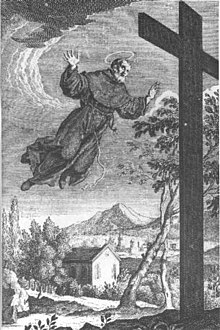The supernatural (Medieval Latin: supernātūrālis: supra "above" + naturalis "natural", first used: 1520–1530 AD)[1][2] is defined as being incapable to be explained by science or the laws of nature, characteristic or relating to ghosts, gods or other supernatural beings or to appear beyond nature.[3]
Contents
[hide]
[hide]
Views[edit]
| This section needs additional citations for verification. (September 2015) (Learn how and when to remove this template message) |
See also: Anthropology of religion
The metaphysical considerations of the existence of the supernatural can be difficult to approach as an exercise in philosophy or theology because any dependencies on its antithesis, the natural, will ultimately have to be inverted or rejected.
One complicating factor is that there is disagreement about the definition of "natural" and the limits of naturalism. Concepts in the supernatural domain are closely related to concepts in religious spirituality andoccultism or spiritualism.
The term "supernatural" is often used interchangeably with paranormal or preternatural — the latter typically limited to an adjective for describing abilities which appear to exceed the bounds of possibility.[5]Epistemologically, the relationship between the supernatural and the natural is indistinct in terms of natural phenomena that, ex hypothesi, violate the laws of nature, in so far as such laws are realistically accountable.
Many supporters of supernatural explanations believe that past, present, and future complexities and mysteries of the universe cannot be explained solely by naturalistic means and argue that it is reasonable to assume that a non-natural entity or entities resolve the unexplained.
Views on the "supernatural" vary, for example it may be seen as:
- indistinct from nature. From this perspective, some events occur according to the laws of nature, and others occur according to a separate set of principles external to known nature. For example, in Scholasticism, it was believed that God was capable of performing any miracle so long as it didn't lead to a logical contradiction. Some religions posit immanent deities, however, and do not have a tradition analogous to the supernatural; some believe that everything anyone experiences occurs by the will (occasionalism), in the mind (neoplatonism), or as a part (nondualism) of a more fundamental divine reality (platonism).
- incorrectly attributed to nature. Others believe that all events have natural and only natural causes. They believe that human beings ascribe supernatural attributes to purely natural events, such as lightning, rainbows, floods, and the origin of life.[7][8]


No comments:
Post a Comment